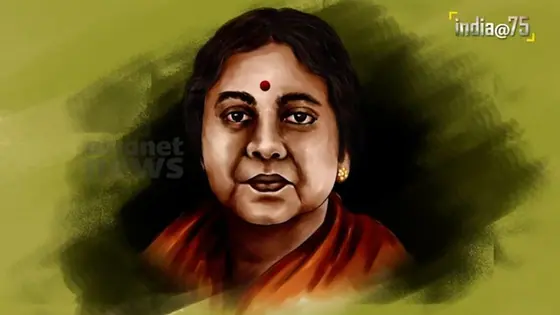
India@75: Kamaladevi Chattopadhyay, the first Indian woman freedom fighter to be arrested
Kamaladevi Chattopadhyay has several firsts to her credit. She was one of the first Indian woman to be arrested for fighting for freedom.
Kamaladevi Chattopadhyay has several firsts to her credit. She was one of the first Indian woman to be arrested for fighting for freedom. She was the first Indian woman to contest a legislative election. She was the first woman from the Saraswat Brahmin community to marry and obtain a legal divorce after being widowed. She was the first woman from her community to go abroad and study at the university.

Freedom fighter, social reformer, politician, cultural leader, a proponent of handicrafts, feminist, educationist, actor, and patron of performing arts. Not many women like Kamaladevi in modern India have fought many odds and yet made significant marks in a number of fields.
Also read: India@75: Perungamanallur, Jallianwala Bagh of the South
Kamaladevi was born in 1903 to a nationalist family belonging to the Saraswat Brahmins of Mangalore. Father Ananthayya Dhareswar, a district collector, died early, leaving nothing much for his wife and children. Kamala imbibed her free spirit from her mother, Girijadevi, who raised her children as a single mother. Even as a girl, Kamala questioned many orthodox Brahmin traditions practised at her mother's house.
Kamala was married at 14 and widowed two years later. She joined the Queen Mary's college in Chennai for studies when her best friend was Suhasini Chattopadhyay, sister of Sarojini Naidu and later became a firebrand Communist. Kamala fell in love with Suhasini's brother Harindranath Chattopadhyay, and they got married. It was the first widow remarriage in her community.
Also read: India@75: Jammu and Kashmir, the conflicts within
Kamala and Harindranath sailed to England, and she joined the London University. Harindra and Kamala got involved in the emigrant Indians' activities for freedom. Back in India, Kamala became active in Congress and the Gandhian agitations. Gandhi made her in charge of the Seva Dal and included her in the salt satyagraha committee. She courted arrest while trying to sell the counterfeit salt at the Bombay Stock Exchange made by the satyagrahis. Thus she became the first Indian woman freedom fighter to be arrested.
Kamala became a close associate of Margaret Cousins, the famed Irish suffragette and supporter of Indian freedom. Cousins became the founder and president of the All Indian Women's Conference and Kamala its first organising secretary. Inspired by Cousins, Kamala contested in the Madras Presidency Legislative Council elections of 1926. Though she lost narrowly, Kamala became the first Indian woman to contest a legislative election. To spread women's education, she was among those who founded Delhi's Lady Irwin Women's college in 1932. Kamala was separated from her husband Harindranath by then in the country's first court-granted divorce. She also acted in a few Kannada and Hindi films.
Also read: India@75: Abbakka Chautha, the first Indian queen who fought against colonial invaders
After independence, Kamaladevi became an institution builder, a proponent of the cooperative movement for women, and an ambassador for Indian handicrafts. Kamala was at the forefront of setting up the Sangeet Natak Akademi and the National School of Drama. She also underwent training in Kutiyattam under Mani Madhava Chakyar. Kamaladevi passed away in 1988 at 85 after an entire life of action and dedication.